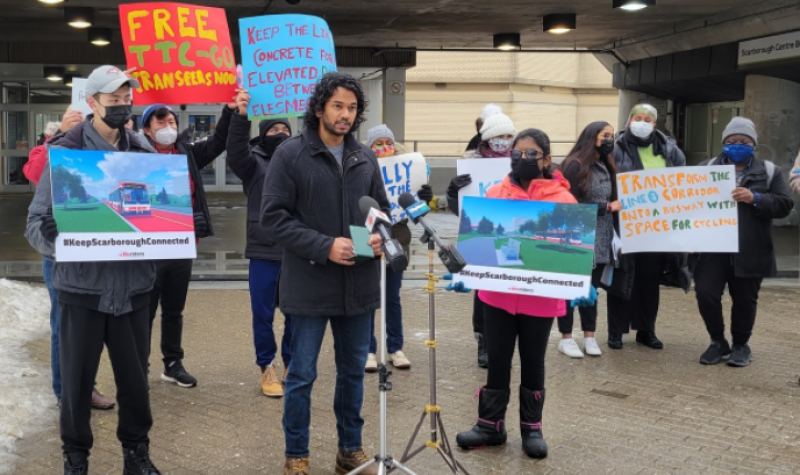Starting in 2010, TTC Riders is culmination of groups dedicated to pushing back against rising transit fares for riders and acting on behalf of them, according to campaigns committee member Vincent Puhakka.
Today, the grassroots organization continues to launch a range of initiatives that include addressing the TTC’s current service and financial cuts, and the removal of the Scarborough rapid train (RT) - the east end's longtime light rail train.
Among the long-term goals fueling the organziation's initiatives is changing the TTC transit funding model.
"We think the transit funding model is broken," said Puhakka. "The TTC, a major transit system in North America, is the least funded per rider, and so a majority of daily operations funding actually comes from you and me - the riders ourselves."
He said this model is unsustainable because fares cannot continously rise while their pay is not increasing. One of TTC Riders' successes in acheiving afforable transit is the fair pass, which is a 33 per cent discount on monthly passes for low-income workers - the parameters of the pass continue to be pushed by TTC Riders to make it more inclusive and attainable.
"The problem is it [fair pass] hasn’t been expanded," Puhakka said. "There is a whole constellation of folks who don’t qualify for the narrow definition."
Further, the funding model is vulnerable to crises like COVID-19 as ridership severely decreased, Puhakka said. During Toronto's first lockdowns in 2020, ridership was down by about 88 per cent, and has since bounced back to 45 per cent of the pre-pandemic level, according a TTC report in September.
As restrictions continue to loosen with Ontario reopening this month and demand for accessible transit bound to increase, Puhakka said the TTC has yet to fully restore the lost services on several train and bus routes.
This includes the status of Scarborough's transit beyond Kennedy station with the removal of the RT, leaving high density areas unserviced. According to a 2019 report, Scarborough makes up about 25 per cent of Toronto's population.
The city announced that the subway would be expanded into Scarborough to replace the RT, which has been in commission since the 1980s.
However, construction is until 2030 at the earliest, leaving residents with proposed shuttle bus alternatives. This would further increase service delays and traffic, Puhkka said.
"The subway [expansion] is going to get delayed, guaranteed," he said. "People can't get stuck in mixed traffic for 10 years."
TTC Riders is calling for a dedicated busway to replace the RT to ensure faster transit for Scarborough residents during the construction period. Its installation may also set the precedent for other areas around the city requiring faster service along busy routes, Puhakka believes.
Looking towards the expected increase in Toronto residents requiring accessible transit as more in-person activities return, Puhakka said riders have a right to push for better service.
"You don't have to just go home and grumple about the situation, you can actively make it better," he said. "Don't just let stuff be done to you. You need to fight back."
TTC Riders' next scheduled event is a Scarborough RT outreach on Feb.24.
Listen to Vincent Puhakka's full interview here:


